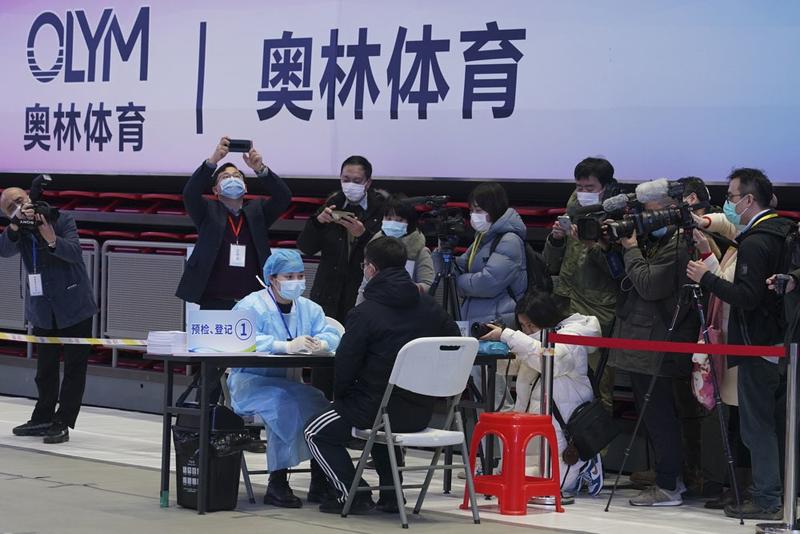 Reporters from home and abroad attend an opening event organized by the Shanghai municipal government at a COVID-19 vaccination center in the city's Jiading district. (GAO ERQIANG / CHINA DAILY)
Reporters from home and abroad attend an opening event organized by the Shanghai municipal government at a COVID-19 vaccination center in the city's Jiading district. (GAO ERQIANG / CHINA DAILY)
A mobile-based app for checking health codes in Beijing has started to show users' COVID-19 vaccination status as the capital steps up its inoculation drive, which started Jan 1.
The move may pave the way for a de facto immunity passport, though many uncertainties remain about its implementation.
The Beijing municipal government refers to the health kit as the jiankangbao.
Locals who have received the first dose of the vaccine have found that their app has added a line under their photo, saying the person has "received the first dose of the vaccine" when they check their health status
Locals who have received the first dose of the vaccine have found that their app has added a line under their photo, saying the person has "received the first dose of the vaccine" when they check their health status.
The government has not said whether this will replace some epidemic control measures such as a nucleic acid test and information registration before entering public areas. But many netizens have expressed hopes on social media that it will ease the entry process.
Gao Yan, director of the infectious disease department at Peking University People's Hospital, said authorities need to collect a larger number of samples of those who have received the vaccine in order to ensure the accuracy of any measures taken.
READ MORE: Hubei adopts health code system, relaxes travel curbs
"Vaccination is the most effective method to thoroughly turn the tide of the epidemic," Gao said. "The ultimate solution is herd immunity, which requires more time and effort. The pandemic has been around for only a year, so it is still new to us."
However, she mentioned that it's possible that people who have completed the vaccination steps might be able to use the result as an entry pass or not be barred from traveling to another city-as long as authorities collect enough information to fine-tune the measures.
Beijing jiankangbao includes a scanning function to track registration, which can be applied in venues such as office buildings, restaurants and shopping areas. Users also can make reservations for nucleic acid tests via the app.
Both a person's testing history and vaccination details are shown in the app.
Beijing's government said 1.7 million residents had been vaccinated as of Saturday.
ALSO READ: Health QR code helps curb spread of infection
Priority groups
Health officials started vaccinations for nine key groups, among them customs inspection workers who deal with imported cold-chain products, porters at entry ports and workers in transportation industries. Delivery workers, people who will travel abroad for work or personal reasons, medical workers, workers in mines and energy industries and several types of other government department employees also are covered.
Li Yuan, a senior researcher who had been given the first dose of the COVID-19 vaccine on Sunday in Beijing, said he was vaccinated because he plans to go abroad next month.
"I travel a lot for business, so vaccine protection is important to me," he said. "Meanwhile, I hope it will shorten the quarantine time, which would be a great help for my work."
A driver surnamed Zheng, who works for a car-hailing service in Beijing and who got his first dose on Friday, said his biggest hope is to return to his hometown in Henan province during Spring Festival and to not have to undergo quarantine when he returns.
"It would take me about a month for quarantine based on current measures, which means I would have no income for a whole month," he said.
Vaccinations also have started in 25 other cities. As of Monday, around 820,000 people in Shanghai who are among the key groups have gotten COVID-19 vaccines, including nearly 240,000 who have completed the two-shot series, the city said on Tuesday.
Zhou Wenting in Shanghai contributed to this story.


